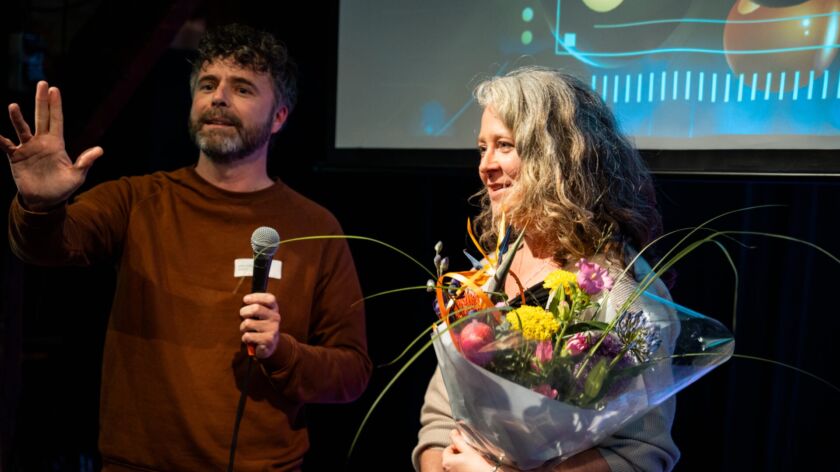University magazines are strengthening their independence with revised statutes
-
 Saskia Bonger van Delta neemt haar Kringaward in ontvangst (2024). Foto: Johannes Fiebig
Saskia Bonger van Delta neemt haar Kringaward in ontvangst (2024). Foto: Johannes Fiebig
After censorship in Delft and Eindhoven, several university magazines have boosted their independence with an update editorial statute. ‘Something you hope you never need, but must be present.’ A revision of the statute is also being worked on in Nijmegen.
Almost two years ago, higher education was confronted with two censorship issues, in Delft and Eindhoven. This led to a great deal of controversy and debate in the House of Representatives. Then minister Dijkgraaf was one of the people who stood up for independent journalism at higher education institutions.
Since then, several education magazines have worked on a new editorial statute. This document states that they’re journalistically independent of the educational institution that pays them.
Lifebuoy
Two weeks ago, Erasmus Magazine of Erasmus University presented a new statute. Not because there was censorship in Rotterdam, but to prevent it. Such a statute is ‘something you hope you never need, but must be present’, writes editor-in-chief Wieneke Gunneweg. She compares it to a lifebuoy: once you’re in the water, it’s too late to craft one.
One way in which the statute boosts the independence of the editorial team is by explicitly stating that the university ‘will respect the free and independent professional practice of journalists’.
Liable
At Delta, Delft University of Technology’s magazine, there was more going on. Last year, under pressure from university lawyers, the editorial team took a piece offline about the culture of fear under a former director. The editor-in-chief would be held personally liable for any damages if she allowed the piece to stand.
Now, the Executive Board has approved a new statute for Delta. This says that the board ‘protects’ independence. ‘This sounds a lot more active than the ‘entrust’ that sounded conditional in the previous Statutes’, writes Saskia Bonger in an editorial.
Dismissed
At the beginning of this academic year, Eindhoven University of Technology’s Cursor was also given a new status. The old version still stated that editors should take into account the interests of the university, but that bit has been removed.
Cursor’s own editorial board had advised against publishing an article on conflict of interest. The editor-in-chief was eventually dismissed and the editorial team blacked out its own website because of the growing pressure from the Executive Board not to publish certain pieces.
More editorial teams are in the process of updating their statutes. Profielen also announced last year that it was working on a new statute, after the editorial team had been forced to become part of the marketing and communications department of Rotterdam University of Applied Sciences.
A piece of paper saying you’re independent only protects you if everyone is willing to abide by it. Editor-in-chief of Delta Saskia Bonger writes the following about the new statute: ‘The greatest value of the new Statutes is awareness about why Delta exists, how the Editorial Office works, how journalism works, and how TU Delft should give space for this.’
Revision of Vox’s Editorial Statute
At the initiative of the Vox editorial team, a revision of the editorial statute is also underway in Nijmegen. ‘Although Vox’s independence is well established, the editorial statute is outdated in some areas’, says outgoing editor-in-chief Mathijs Noij. ‘Even in times when Vox’s role is respected, it’s important to remain vigilant about our independence.’
Kring van Hoofdredacteuren, the national association of higher education media, issued a set of guidelines last year for drafting a strong and independent editorial statute. Based on those recommendations, the Vox editorial team, in collaboration with its editorial advisory board, submitted proposals to the Executive Board. A final decision is still pending, after which the proposed changes will be submitted to the University Joint Assembly.
Translation: Taalcentrum-VU



